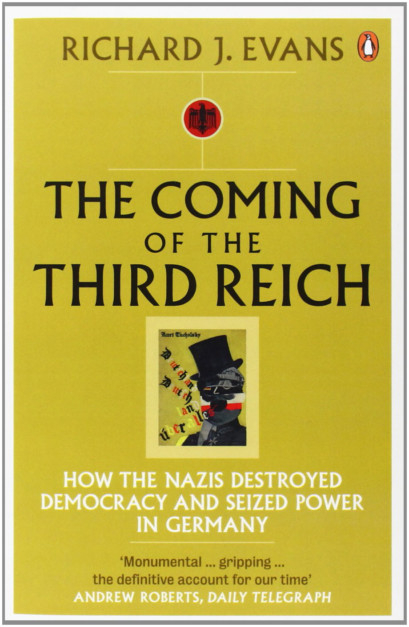
The Third Reich in History and Memory
By Richard J. Evans, Little, Brown, 496 pages, £25
At the start of an academic career that was to elevate him into one of the English-speaking world’s foremost historians of modern Germany, Sir Richard J Evans found himself in 1970 in Hamburg at a dinner hosted by the West German foundation that had awarded him a scholarship.
His hosts could not have been more gracious. Alfred Toepfer, the philanthropic businessman who had created the foundation, praised Britain’s imminent entry into the European Economic Community, later the EU, as a step forward in co-operation between different branches of the Anglo-Saxon race.
Another German working for the foundation expressed support for South Africa’s apartheid regime. After the dinner, Evans looked at the bookshelves around him and spotted “several works of what we would now call Holocaust denial”. The next morning, a housekeeper told him about a recent visitor with “perfect manners” — Albert Speer, Adolf Hitler’s armaments minister.
Evans recounts this episode to illustrate that it took a good few decades after the Second World War for respectable West German society, and business circles, to shed the skin of the Nazi past. West Germany’s essential character as a law-based democracy was not in doubt. However, as Evans pursued his research into pre-1914 imperial Germany, he came to understand that the racist assumptions of Toepfer and his ilk “were common among German elites long before Nazism even existed”.
Evans will be familiar to readers as the author of a compelling, three-volume history of the Nazi era published between 2003 and 2008. In this collection of lucid, absorbing essays, he aims to show how the professional study of German history, particularly Nazism, has changed with the passage of time.
Since that dinner in Hamburg, Germany has undergone extraordinary changes. Apart from the fall of the Berlin Wall, national unification and European integration, there is globalisation to consider, a phenomenon captured in Germany’s position as the world’s third biggest exporting nation, and in the arrival of millions of immigrants.
Thirty to 40 years ago, historians argued about whether Nazism was the horrific outcome of some twisted path to modernity that distinguished Germany from other Western societies. For subscribers to this view, Hitler’s dictatorship was traceable to the failure of liberalism in the 1848 revolution, the power of aristocratic elites, Prussian militarism, a politically deferential middle class and the way all these factors combined to undermine the 1919-33 Weimar Republic.
As Evans, a professor at the University of Cambridge, observes, these arguments have not stood the test of time. The success of democracy in postwar West Germany, and since 1990 in reunified Germany, means that the nation has flourished as a free, liberal polity for almost half the period since Otto von Bismarck united Germany in three wars between 1864 and 1871.
Democracy no longer looks like a plant alien to German soil. Moreover, today’s historians, looking at imperial Germany in its own right rather than as a prelude to Nazism, see a more varied, vigorous society than earlier scholars tended to do.
As a result, many ask different questions about Nazi Germany. What is the relevance of Germany’s shortlived experience as a colonial power to the Nazi era? How far did pre-Nazi social and medical thought, especially on “racial hygiene”, influence the Nazi assault on the disabled, homeless, Gypsies, gays and other marginal groups? Was the Holocaust fundamentally little different from other modern genocides?
Evans suggests answers to these and other questions, urging us not to underestimate “the absolute centrality of violence, coercion and terror to the theory and practice of German National Socialism from the very outset”. We must see the Holocaust as distinctive, because it was driven by the Nazi idea that Jews everywhere in the world were a menace to the German race, Evans says.
The volume consists mostly of previously published book reviews, but two fine essays stand out. One, on social outsiders in the Nazi era, testifies to Evans’s strengths as a social historian whose previous works include “Death in Hamburg”, a study of the 1892 cholera outbreak in that city, and “Tales from the German Underworld”, a fascinating account of crime and punishment in 19th-century Germany.
The second essay, on the diplomatic service under Nazism and in West Germany, mercilessly exposes the foreign office’s postwar efforts to play down its part in Hitler’s crimes. “Germany’s reputation in the world depended, and depends, not least on its ability to come to terms openly and honestly with the Nazi past,” Evans writes. “The continued presence in the foreign office of men implicated in the crimes of Nazism and the persistence of a culture of exculpation in its attitudes to the past made this aim more difficult to achieve.”
Evans doesn’t pull his punches when he wants to make a point about German history. In these essays, as in so much of his scholarship, he is right on the mark.
–Financial Times









